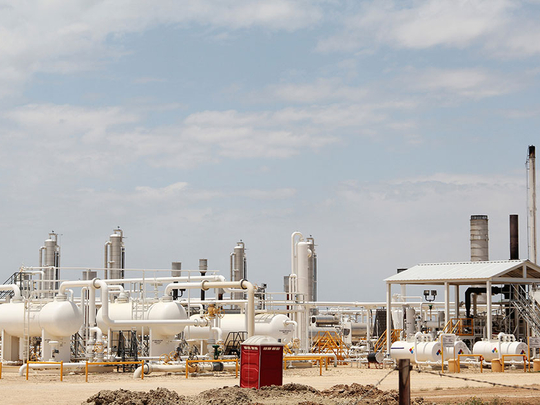
Abu Dhabi: Attention will turn towards rising shale oil production in the US and compliance among oil producers as Opec and its allies extend their output cut agreement to the end of 2018, analysts said.
At a meeting in Vienna last week, Opec members and countries outside the group including Russia, Kazakhstan, Oman, Bahrain among others decided to continue cutting production by about 1.8 million barrels per day until the end of 2018, with a clause to reassess the deal during the next Opec meeting in June.
The original deal was to expire in March next year.
“Attention will now increasingly turn to the US, with the market trying to gauge the impact on production growth from a price trading well above $50 (Dh183.65) per barrel,” said Ole Hansen, head of commodity strategy at Saxo Bank. “Weekly production estimates continue to reach new highs and during the past three weeks US drillers have added back almost half of the rigs that were pulled during the previous three months.”
A major shift in US oil and products trading with the rest of the world has occurred this year, with rising US production finding its way into the global market — both as refined products and, since 2014, increasingly also as crude oil exports.
For the first time, India started importing oil from the US, with 1.6 million barrels reaching the Indian port of Paradip in October.
Rystad, an independent oil and gas consulting service company based in Norway, this week forecast that US oil production could reach 9.9 million barrels per day this month, well above what the Energy Information Administration (EIA) had been forecasting up until now.
“Last week the net import of crude oil and products slumped to just 1.8 million barrels per day, a far cry from the 10 million plus barrels witnessed just six years ago,” said Hansen.
Continued compliance among oil producers will also be in focus over the coming months, with Iraq potentially being one of the candidates struggling to keep its commitment.
While southern Iraqi oil sales have jumped to a record, Oil Minister Jabbar Al Luaibi in Vienna expressed some very ambitious plans to improve the fields around the northern city of Kirkuk, Hansen added.
Back in October, Iraq regained control of the area from the Kurdish Regional Government — a move which led to a temporary drop in supplies from northern Iraq to the Turkish port of Ceyhan and which helped support the oil rally back then.
According to Dr Mamdouh G. Salameh, an international oil economist based in London, the temptation on the part of some Opec and non-Opec members to cash in on the high oil prices increases as oil prices strengthens.
“While Russia agreed on the extension of the production cuts until the end of 2018, it also demanded that the agreement should be assessed in June 2018 to judge if the global oil market has virtually rebalanced. If so, Russia will demand a reduction of the cuts if not withdrawing altogether from the agreement.”
He said Russia has private oil companies which have been investing heavily in expanding oil production, particularly in the Russian sector of the Arctic, and therefore they don’t want to be constrained by the continuation of the production cuts for another year.
The extension of the production cut agreement until the end of 2018 will certainly put a $60-per-barrel floor under oil prices and could strengthen further it by $2 to $4 a barrel, analysts said.
Adnoc reductions for January
In compliance with the Opec deal, the UAE has announced crude oil reduction plans for January, according to a tweet by energy minister Suhail Al Mazroui. There will be a cut of 15 per cent for Murban grade, 5 per cent for Das and 15 per cent for Upper Zakum oil.
“This reflects our ongoing resolve to reduce crude production by 139,000 barrels per day in line with our commitment to Opec,” he said.












